Hey, If you’re a techie, you’ve undoubtedly heard the phrase “data is the new oil.”
The larger companies have the most data. It’s realistic to suppose that Facebook and Google know more about you than you know about yourself.
Given the power and insights that data can provide, it’s no surprise that these businesses protect their data inside their gates. Their business models rely primarily on their ability to collect and use vast amounts of data effectively.
When it comes to investment, the scenario is similar.
Data is being used by large financial organizations to aid in decision-making. The greatest financial decisions will be made by whoever has the most data and the skills to evaluate it.
Similarly, the majority of this information is kept secret, and the average person does not have access to it.
Blockchain technology’s emergence promises an alternative future. A future in which data and information are more open and accessible.
A future that isn’t constructed behind the walls of a few companies’ walled gardens. A future in which the knowledge gap between a person and a company is minimal at best.
In this piece, we’ll take a closer look at blockchain analytics, including how it works and the ideal platform for it, and much more.
Let’s get started.
What is Blockchain Analytics?
Blockchains are immutable, distributed, and decentralized digital ledgers. They’re made up of data blocks that are linked together in chronological order.
A public blockchain is visible due to its decentralized and open nature. Anyone can view real-time transactions on the blockchain and have a better understanding of what’s going on.
The volume and openness of data accessible determine the strength of analytics. The act of evaluating, recognizing, interpreting, and visualizing data on a blockchain is known as blockchain analytics.
You can acquire crucial information that might otherwise be concealed in traditional systems by doing so.

All of this is done to aid in the prevention of illegal transactions such as money laundering and fraud.
Blockchain analytics are performed by private corporations that scrape public blockchain data.
However, because crypto-asset transactions are essentially anonymous, blockchain analytics companies assist in providing the data required to connect a transaction with a person or entity.
Tracking the flow of financial assets in the blockchain can be a massive undertaking; yet, with data science, it is possible to do so at a minimal cost.
How does it work?
Blockchain analytics companies scrape publicly available transactional data to link cryptocurrency wallets to illegal or criminal activity. A crypto wallet, a digital wallet that can transmit and receive money, is used to carry out transactions.
These are normally set up through Know Your Customer (KYC) onboarding processes, which collect and retain the crypto wallet’s owner’s personal information. When a crypto wallet transaction is completed, the data remains on the blockchain indefinitely. It cannot be changed or removed.
Blockchain analytics uses the scraping of these blockchains to link crypto transactions to illegal behavior via particular signifiers such as a crypto wallet previously related to illegal activities such as drug smuggling or terrorist financing.
A wallet or transaction is alerted and given a ‘risk score’ as a result of this. When a crypto company or a financial institution collaborates with a blockchain analytics service, all transactions they conduct can be screened to determine the risk level of the crypto wallet in question.
If additional investigation is required, a blockchain analytics company can provide this information and analysis to the appropriate law enforcement agencies, who can use a Suspicious Activity Report(SAR) to identify a person with an anonymous wallet.
An end-to-end trail is produced since the transactional data in the wallet represents all transactions that the specific coin has been utilized. The analytics provider assigns the wallet a ‘typology,’ which links it to certain illegal conduct that will be highlighted in future transactions.
The service provider will also develop a “heuristic” that groups transactional wallet data into groups with comparable typologies.
When the same individual owns many wallets, it’s easier to figure out if transactions from separate wallets are originating from the same source. Data on the IDs of unlawful transactions is collected on a constant basis.
Blockchain analytics is a critical line of defense for ensuring fair and lawful crypto ecosystems since it aids in the discovery of illegal funds’ source and destination.
Top 5 Blockchain Analytics Platform
Here are the top 5 Blockchain Analytics platforms.
1. Dune Analytics
Dune Analytics is a robust blockchain research tool.
It’s a web-based tool for searching Ethereum data from pre-populated databases using basic SQL queries. Instead of building a customized script, a database query can be used to retrieve practically any information from the blockchain.
It’s an excellent resource for blockchain study.
On the Ethereum blockchain, it can be used to query, extract, and display massive volumes of data.
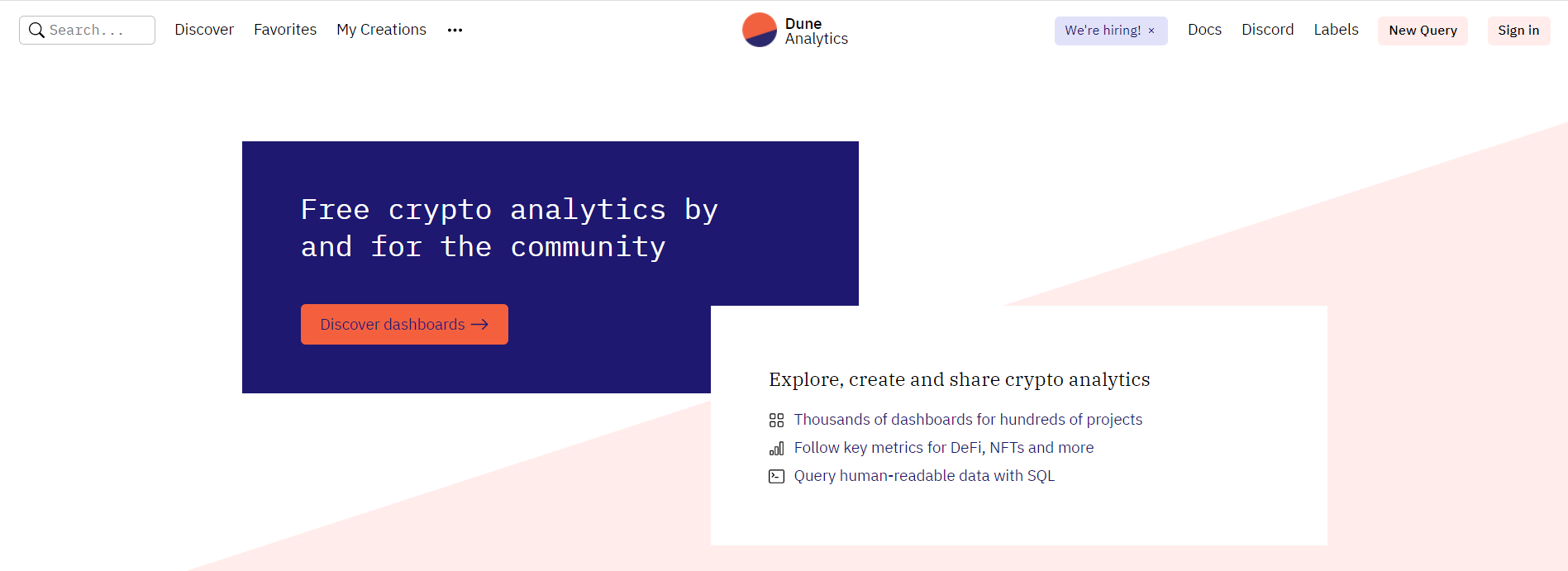
Dune Analytics will also provide you with a chart that you can export. With a more thorough and flexible view, you’ll have access to all on-chain Ethereum. Dune Analytics is extensively utilized by projects that employ ETH coins to visualize blockchain analyses as charted data.
It is, thus, a business-to-business platform. Dune is more than just a querying environment; it’s also a location where you can interact with and analyze data from the database for your business.
You do not need to develop a popular dashboard on the platform. You can examine the written Query codes for hundreds of preconfigured Dashboards.
Furthermore, there are so many metrics available that you can acquire a lot of on-chain information from them.
Pros
- It provides access to all Ethereum databases as well as a wealth of information regarding the Ethereum blockchain.
- It makes every effort to make difficult blockchain ideas understandable to the average person using visuals, pre-built dashboards, and queries.
Cons
- Its graphical user interface has a lot to be desired.
- There isn’t enough place for chart modification.
- In terms of cost, access to the Pro plan is on the expensive side.
Pricing
You can begin using the platform with its free community edition. It also has a premium edition that costs $390/month/user.
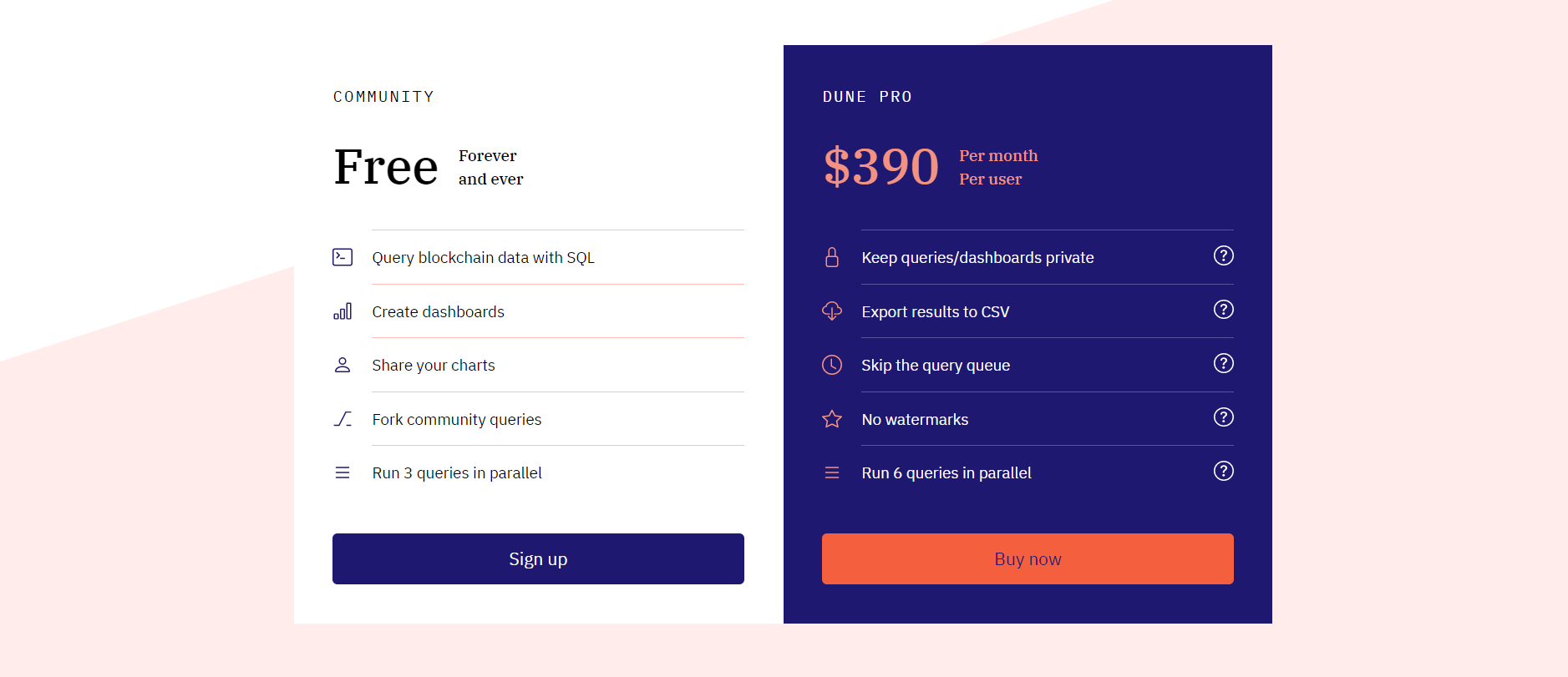
2. Glassnode
Glassnode is a blockchain analytics startup that provides institutional and retail crypto investors with on-chain market intelligence and exchange data via their Glassnode Studio web interface and API, as well as market analysis and comments through Glassnode Insights.
Hundreds of indicators, including transaction data, wallet holdings, miner statistics, and derivatives volumes, are included in their service.
It also keeps track of on-chain market indices including Statement of Recommended Practice(SOPR), Unrealized Profit/Loss, Pull Multiple, and Coin Days Destroyed, among others.
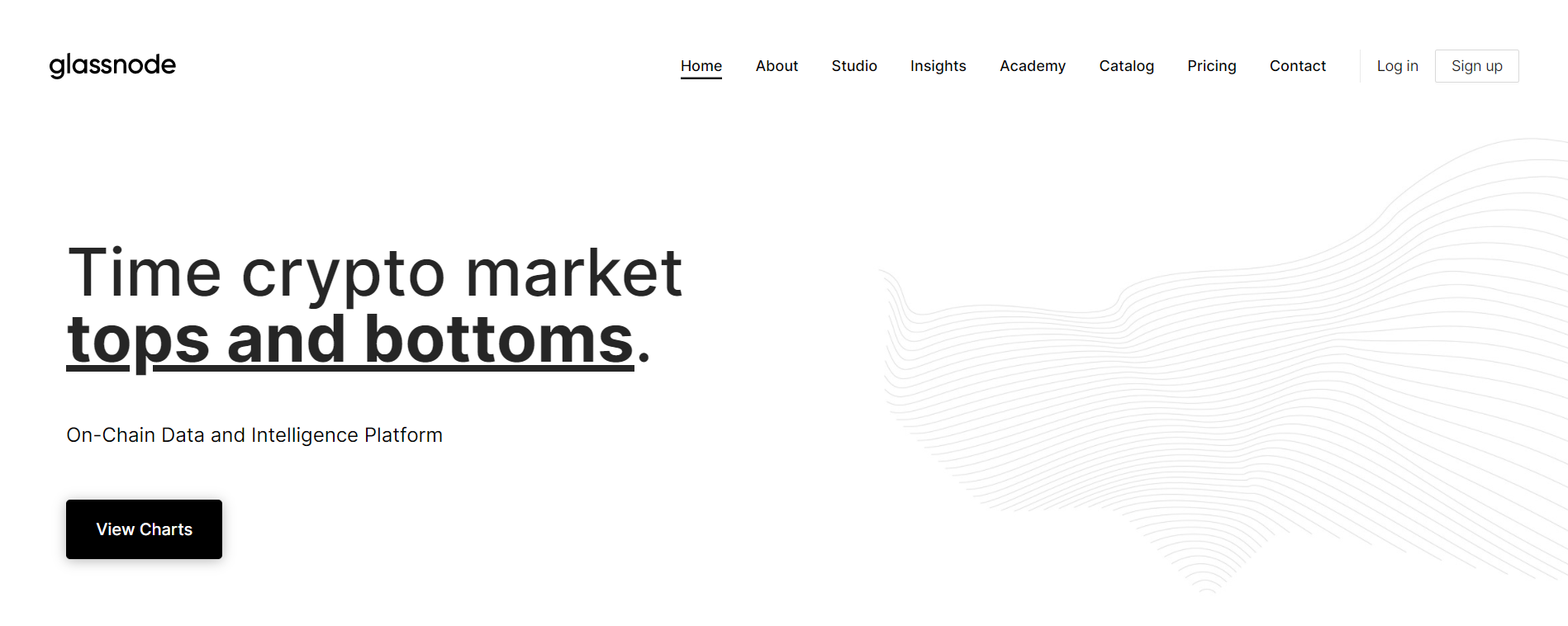
It adds data intelligence to the world of blockchain and bitcoin. By focusing on the most crucial input source in the space: data from the blockchains themselves, Glassnode creates applications that give new methods of giving insights into blockchains and cryptocurrencies.
Not only does it have several unique measurements, but it also contains over ten years of data that can assist traders in recognizing repeating patterns and applying the best possible methods to their trading actions.
Pros
- For research purposes, it provides thorough analytical data.
- It offers an editable chart interface and a customizable UI.
- It gives its consumers a thorough understanding of crypto terminology.
- Coins can be compared to graphs that have been overlaid on them.
- It supports a wide range of cryptocurrencies.
Cons
- There is no alert system.
- It could be too technical for novices to grasp.
Pricing
You can begin using the platform with its free standard edition. It also has a premium edition which starts from $29/month (paid yearly).

3. Chainalysis
Chainalysis supplies research and government agencies with data and software. This solution combines investigative, risk management, and compliance tools to address cyber-criminal actions on the blockchain network using sophisticated analytics.
KYT, or the Know Your Transaction tool, from Chainalysis detects dangerous transactions from fraudulent and illegitimate addresses. Investigating transactions is made easier thanks to the user-friendly UI.
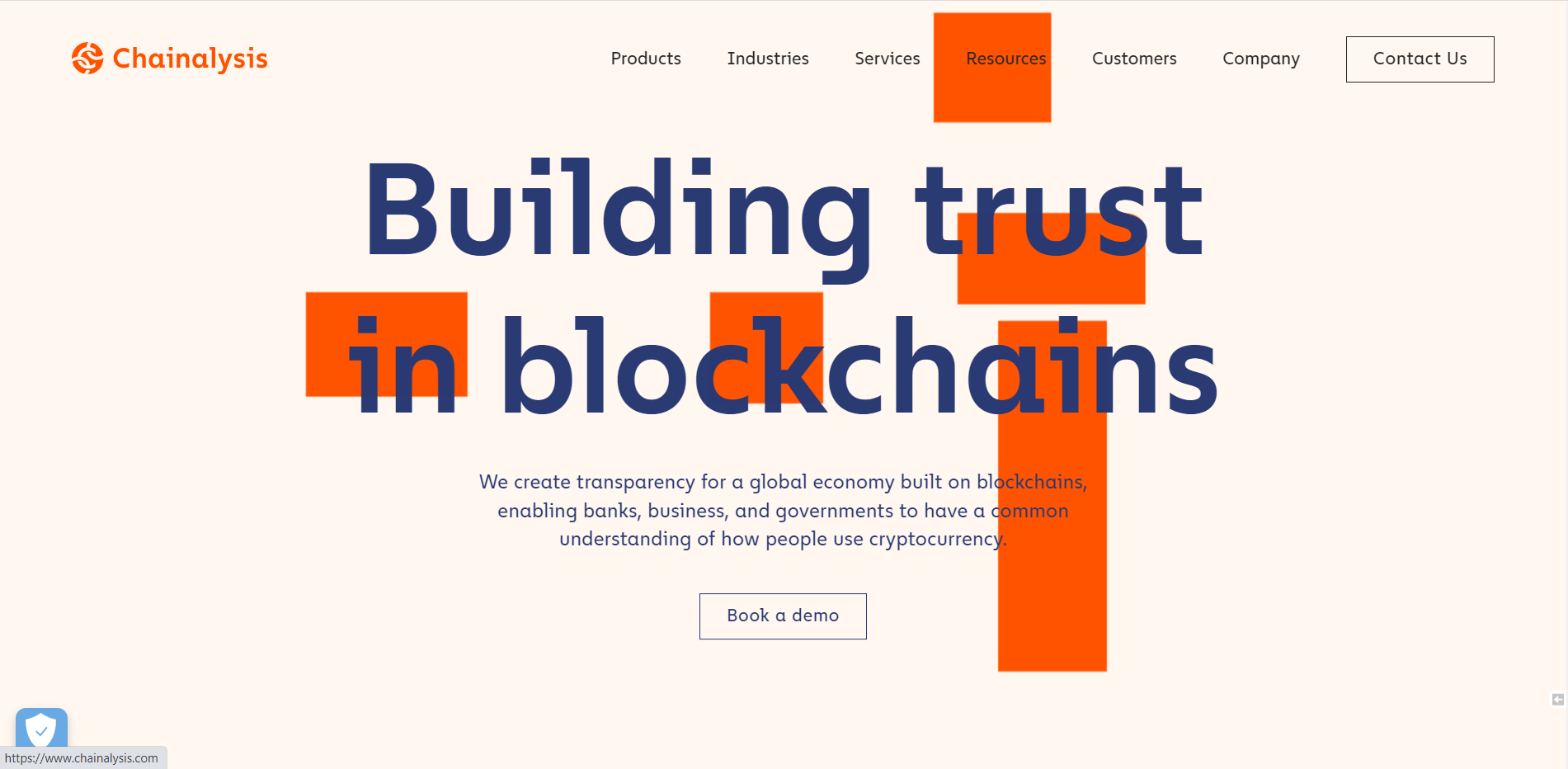
The Reactor tool aids in the visualization of crypto address money flow.
Finally, the Kryptos program creates profiles for all crypto-based enterprises and functions as a service reference directory.
It is essentially a blockchain data and investigation solution for gaining insights.
It aids in determining the motivations and tactics used by people when moving funds between public blockchains throughout the world.
Pros
- Simple to use.
- Audit trailing is useful.
- The alert system is excellent, and it is simple to use.
- It’s a good idea to identify potential risks.
Cons
- The Risk Score is not updated automatically.
- It is not feasible to tailor warnings to individual service providers.
Pricing
The pricing section is not listed on the platform.
4. Elliptic
Elliptic would be missing from any ranking of the top blockchain analytics businesses in 2022. It is a leading analytics organization in the field of crypto-asset risk management.
It is used by major cryptocurrency exchanges and financial institutions all around the world. It offers a variety of solutions for bitcoin compliance and blockchain research.
Elliptic Lens provides you with the information you need to secure your company and your consumers.
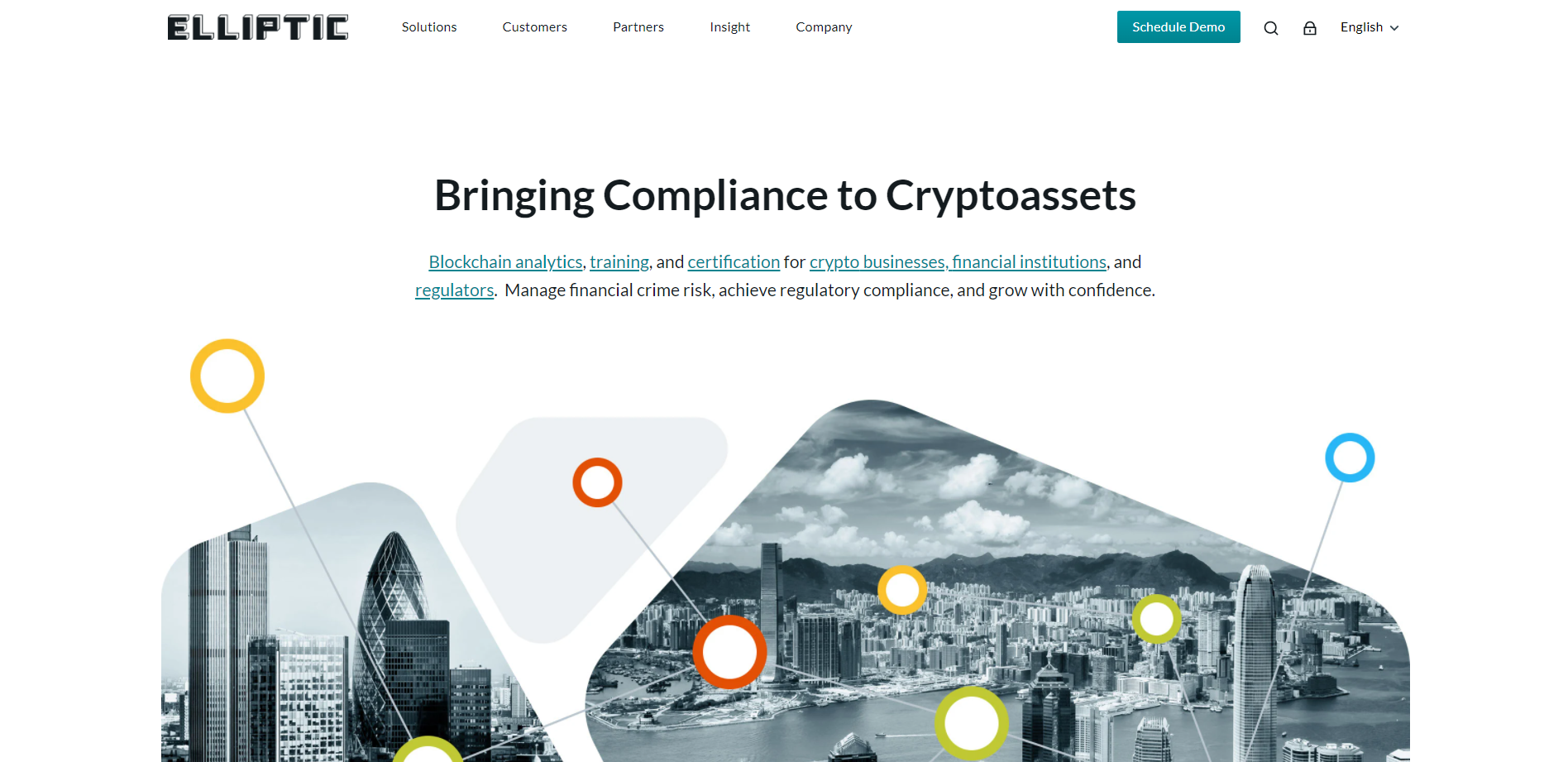
The lens is used by fraud, compliance, and operations teams to expose cryptocurrency wallets, providing visibility into who is behind each address as well as the money movement in the wallet.
The sophisticated tracing capabilities and adjustable risk rules of Elliptic Navigator provide a consistent and accurate picture of the source and destination of money for over 100 crypto assets.
Elliptic gathers data from both publicly available and privately accessible sources of information.
As a result, it can aid in the recognition of real-world identities on blockchain networks. It also recorded Bitcoin transactions related to a Twitter attack in 2021.
Pros
- Automated transaction risk rating based on Elliptic’s blockchain analytics can help you speed up compliance inspections, eliminate manual intervention, and save money.
- You can keep track of your clients’ cryptocurrency behavior across all of their transactions. Using powerful analytics and risk indicators, detect questionable activity early.
- Maintain a thorough audit trail of cryptocurrency transactions and export complete, accurate data to easily file Suspicious Activity Reports (SARs).
- Utilize Elliptic Navigator’s blockchain tracing features to see where a transaction originated or is being transmitted.
Cons
- As such no limitations.
Pricing
The pricing section is not listed on the platform.
5. CoinMetrics
CoinMetrics is a crypto financial intelligence service that offers network data, market data, indexes, and network risk solutions to the world’s most famous organizations.
On-chain data is often changed, and keeping track of it in real-time can be difficult.
CoinMetrics, on the other hand, succeeded in getting its measurements down to a block-by-block timescale.
As a result, after miners confirm a block, you’ll receive updated data.
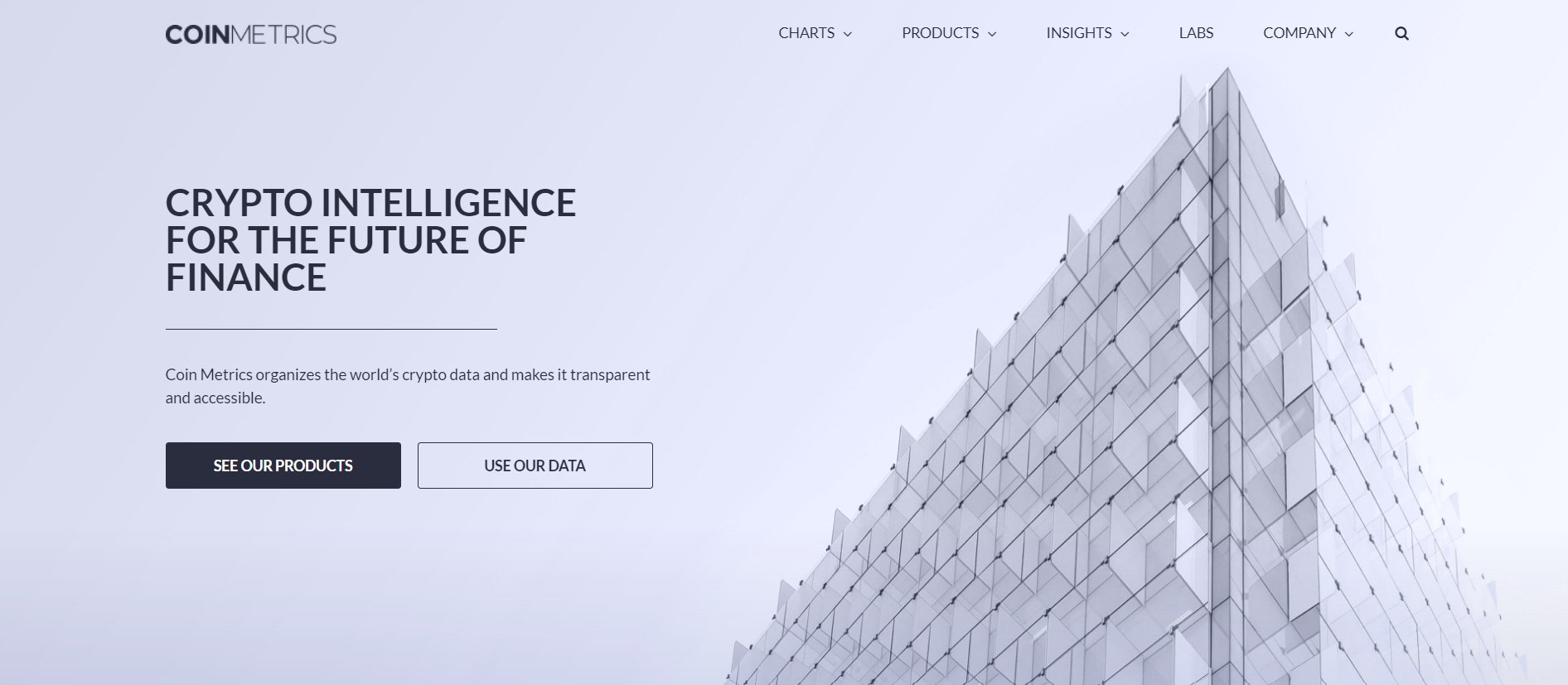
You’ll get access to more than 100 assets and 300+ metrics for each of them when you use CoinMetrics. As a result, you’ll never miss an opportunity because you’ll be able to examine practically all the key charts.
It provides clear and actionable statistics to a variety of industry players, including financial institutions, media, research sources, and funds.
Coin Metrics’ data assists users in building value and improving engagement with blockchain-based assets. It’s also useful for figuring out how public blockchains work in terms of economics and operations.
Pros
- Simple and straightforward to use
- A massive variety of metrics are provided.
Cons
- There is no chart editing.
- There are no social measures such as social dominance or social trends.
Pricing
The pricing section is not listed on the platform.
Future of Blockchain Analytics
As most nations have yet to align their laws with cryptocurrencies, many of them are grappling with how to control and administer these new types of digital entities. Cryptocurrencies confront a one-of-a-kind dilemma.
They have the power to transmit and transfer money at a very high level, but because they are so numerous, digital currencies are vulnerable to being stolen by persons who can perpetrate major fraud on an unprecedented scale.
This creates new problems for financial institutions as they strive to comprehend these new participants in their sphere of influence while also focusing on genuine client demands rather than income creation potential.
More than any other country, the United States has taken the lead in enacting comprehensive cryptocurrency legislation.
Not only are they prone to fraud and hackers, but cryptocurrency-related firms are starting every day on the worldwide market, resulting in a rush of new enterprises. While certain sections of the globe accept and work with cryptocurrencies, others are still unsure of their authenticity.
Cryptocurrencies are here to stay, but they’re not accepted in every country. Because global legislation is in motion as it tries to figure out how bitcoin should be regulated throughout the world, it will almost probably take several years before we see widespread usage.
The law aims to break down the barriers that exist between national financial rules and to serve as an example for other nations across the world in embracing digital currency transactions within their borders.
This action will provide more protection against large-scale fraud against its population.
All major worldwide organizations are keeping a careful eye on developments like these, which might have a significant impact on the near future of cryptocurrencies in general across the world.
Conclusion
Blockchain technology, unlike traditional banking, allows for permissionless innovation. The availability of free data enables developers to create sophisticated tracking tools.
Today, blockchain corporations safeguard thousands of businesses across the world while also assisting law enforcement authorities in the fight against bitcoin fraud.
However, with blockchain analysis technology, there is always a risk regarding user privacy. It is, however, the only means to track down cryptocurrency-related criminal activity. Both law enforcement organizations and crypto firms would be practically blind if they didn’t have them.
As a result, we feel that blockchain analysis software is critical for widespread crypto acceptance and long-term viability.




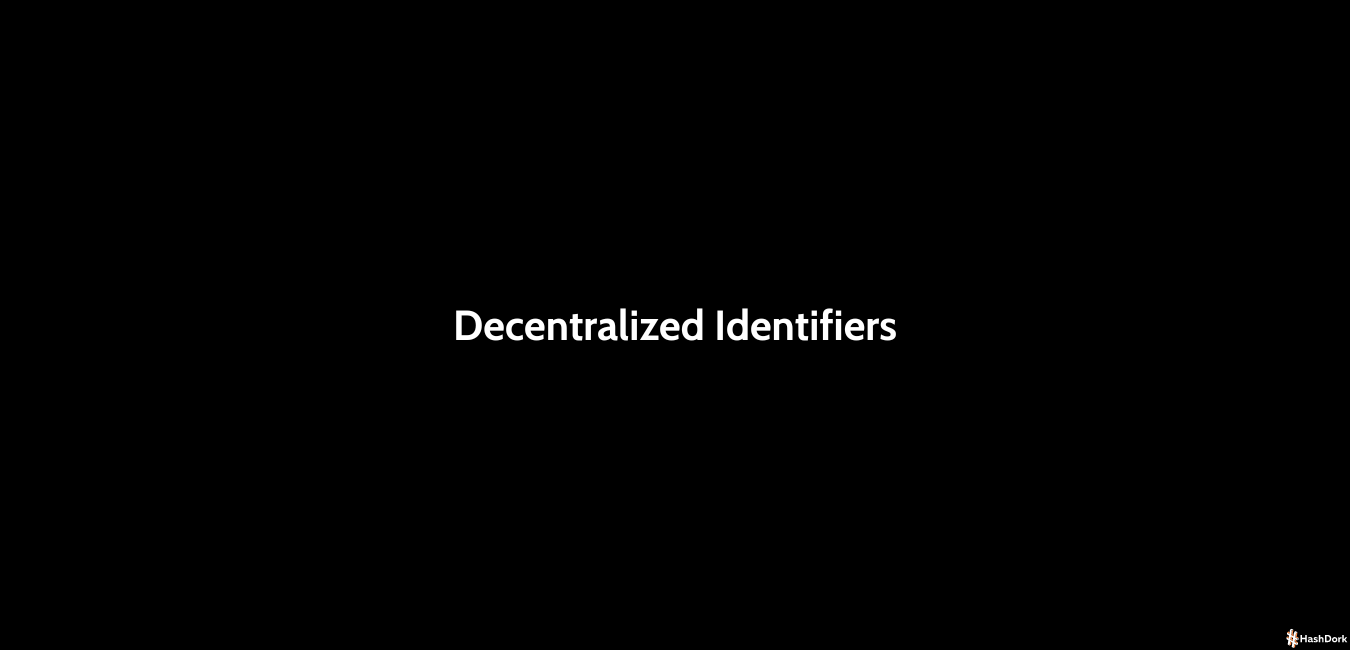
Leave a Reply